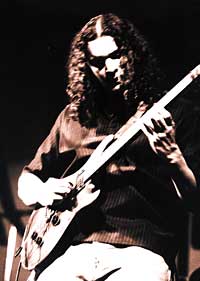 "Pakistanis, this way! Make a line here!" A straggling line duly forms at Mumbai's airport counter where Pakistanis entering India must register themselves. With passports, disembarkation forms and duplicate copies of the registry form to be stamped here, the travellers resign themselves to a long wait.
"Pakistanis, this way! Make a line here!" A straggling line duly forms at Mumbai's airport counter where Pakistanis entering India must register themselves. With passports, disembarkation forms and duplicate copies of the registry form to be stamped here, the travellers resign themselves to a long wait. The end of the line is formed by a large, high-spirited group of musicians and their guitars: Fuzon and the Mekaal Hasan Band headed for Kolkata to play at a fund-raising concert for tsunami victims. They are accompanied by their managers, law student Erum Sattar and actress Sania Saeed, possibly the first female managers of any music band in South Asia.
Several people recognise Sania, including a Bangalore-bound gent. There is camaraderie and good humour, a bond shared by being in this tedious, unnecessary line. "At least this time they're being polite," says Nausheen Wasi, a young lecturer from Karachi University, headed to Goa for a South Asian conference on democratisation, peace and regional cooperation.
Fuzon's restless lanky lead guitarist Shallum, wandering up and down the line, stops to ask if he could be fitted in a bag and taken to Goa. This is his second time in India. Last June, Fuzon participated in an event called 'Sarhadon ki Jugalbandi' at Pragati Maidan in Delhi, where they jammed with Indian Ocean. It was a memorable concert, also featuring Kailash Khair and Rahat Fateh Ali Khan.
The Mekaal Hasan Band (MHB) made its debut in India more recently, at a show called 'Sufi on the Rocks', organised by Etc, a TV network partially owned by Zee. Apparently, it was Aakar Patel, the influential Editor of Mid-Day who prevailed upon Etc to launch the MHB in India, after having heard them rehearsing at their studio in Lahore, where he had come for a lecture at Kinnaird College. At their concert before the Mumbai press fraternity on 7 January, MHB played to what was by all accounts an amazing reception. At one point, as the band members stood aside during a break, Kailash Khair approached them and said how much he was enjoying the music.
"He asked if he could join us, and we said sure, so after the break, he played with us. It was great," says Mekaal. The event was hugely hyped in Mumbai, complete with billboards at Juhu Beach, though one didn't hear too much about it in Pakistan-another indication of the Great Divide. A personal email from a senior journalist at the time mentioned how popular the event had been and how much people had enjoyed it.
Pakistani bands playing in India invariably get a great reception and particularly appreciate the music-knowledgeable audiences they find there. Obviously, there are spoilsports everywhere. They are encouraged in their cussedness by the needless restrictions that the Indian and Pakistani governments place on each other's citizens, whom they treat quite differently from visitors of other countries. At this point, officially there are few ways to visit each other's countries. The governments sometimes allow visiting Indian and Pakistani musicians and artistes to perform on the other side and sometimes not.
Last May, the Pakistan High Commission in New Delhi denied the Indian dancer Sharmistra Mukherjee a visa at the last minute, even though she had obtained the necessary clearance from the Interior Ministry. But when embassy officials in Delhi learnt that she planned to participate in a classical dance performance, they said she needed special permission. The event in Karachi and Lahore, organised by Sheema Kermani, had to take place without her.
Breakthroughs like the Srinagar-Muzaffarabad bus service are important. But what's needed to really normalise relations is to make cross-border visits easier. There is no reason why Pakistanis should have to stand in special lines to register their arrival at the Indian port of entry or why Indians should report their arrival and departure to the Pakistani police (except the fortunate few who are granted exemptions based on connections) and vice-versa. There is no reason why visas should be valid only for cities rather than the country, and/or the stipulated points of entry and departure shouldn't be changed if the traveller wants. These basic bureaucratic hurdles can and must be removed.
Fuzon and the MHB performed at the Grand Hyatt in Mumbai on Sunday at another fund-raiser for the tsunami victims. They could have made a spontaneous detour and performed at the Pakistan India Peoples Forum for Peace and Democracy Convention but their visa was not valid for New Delhi.
Beena Sarwar is the contributing editor of The News, in Karachi.


